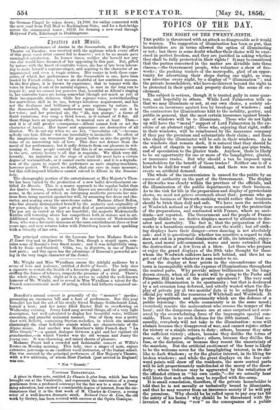t4ratrts sub 3/1usir.
Alboni's performance of Amina in the Sonnambrcla, at Her Majesty's Theatre on Tuesday, was received with the applause which every effort of this great vocal artist cannot fail to deserve ; yet it by no means gave unmingled satisfaction. In former times, neither she herself nor any one else would have dreamed of her appearing in this part. But, gifted by nature with the finest of contralto voices, she has of late been labour- ing to make herself a soprano-singer, and aspiring to the character of an impassioned and even a tragic actress. Her essays in both these capa- cities, of which her performance in the Sonnambula is one, have been lauded by French critics ; but we are doubtful of her continued success. In the first place, it is known by experience, that to tamper with the voice by forcing it out of its natural register, is sure in the long run to impair it ; and we cannot but perceive that, beautiful as Alboni's is, her contralto tones are losing somewhat (though not much as yet of their incomparable richness, while her soprano voice, notwithstan g her marvellous skill in its use, betrays laborious acquirement, and has not the freshness and brilliancy of a pure soprano by nature. In the Sonnanibula, the music underwent many changes to suit it to her voice; and her principal air, the " Ah, non giunge," a tissue of florid variations, was sung a third lower, in G instead of B flat. All these things have an injurious effect, to musical ears at least. Then— and it is of still greater consequence--Alboni cannot look or act the character of Amine. Her figure and appearance are destructive of all illusion. We do not say when we see her, incredulus odi "—because ]obody can hate Alboni—but our incredulity is invincible. No effort of the imagination can transmute the person before us into the pretty he- roine of an interesting tale of love. This does not detract from the merit of her performance, but it sadly detracts from our pleasure in wit- nessing it. Some people contend that this is of no consequence—that, in the arts, artistic beauty is all that is requisite. We think very dif- ferently. An imitation on the stage of actual life must have a certain degree of verisimilitude, or it cannot excite interest ; and it is a degrada- tion of the opera to regard the performers as mere singing-machines, however perfect. We must, no doubt, shut our eyes in some measure ; but this self-imposed blindness cannot extend to Alboni in the Sonnam- bide.
The choregraphic portion of the entertainment at Her Majesty's Thea- tre has been varied by the production of a new ballet divertissement en- titled La Hanola. This is a nearer approach to the regular ballet than Les Qualre Salem*, inasmuch as the dances are preceded by a dramatic scene, in the course of which an intriguing soubrette prevents her mis- tress from being married against her will, by assuming her dress and cha- racter, and scaring away the unwelcome suitor. Madame Albert Bellon, who has already distinguished herself by the audacity and originality of her poses, displays in this part a great deal of pantomimic proficiency The pea are as varied as they are beautiful ; the majestic Mademo' e Ratline still towering above -her competitors both in stature and in art. Additional strength, too, is gained by the accession of Mademoiselle Rosa, who was a favourite dauseuse at the same establishment three or four years ago, and now returns laden with Petersburg laurels and sparkling with a vivacity of her own.


































 Previous page
Previous page